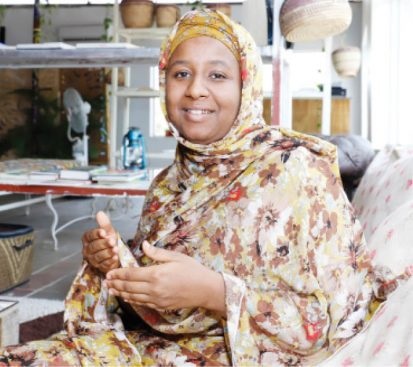How I convert disposed nylons into money—Bashir Kurfi

Katsina-born Intissar Bashir Kurfi is an architect, trained at the prestigious Ahmadu Bello University, Zaria. Although a housewife and mother of three, she is also an entrepreneur. In this interview with Esther Ogala, she spoke about her family life and the business of converting disposed nylons into money.
Who is Intissar Bashir Kurfi?
My name is Intissar Bashir Kurfi from Kastina state, a housewife and mother of 3 kids. I earned a degree in Architecture from Ahmadu Bello University, Zaria. I am actually a family-oriented person, hence lots of friends and family are always with me. However, I try to joggle between them and what I love doing–interlocking production.
Did your background in Architecture influence in anyway your interest in bio-energy industry?
Getting a degree in Architecture from Ahmadu Bello University really influenced my interest in bio-energy. During my final year in school, I found out what was called sustainable architecture and that inspired my B.SC research in the compliance to sustainability of some selected buildings in ABU, Zaria.

That was even before UN started sustainable development goals. I also had interest in architecture but from the sustainable architecture point of view. In 2015 when the sustainable development came, I knew it was time.
Why interlocking tiles production and not other conventional jobs?
I focused on interlocking tiles production because I have always felt unique. I don’t do things because majority do it or because it is lucrative. I love identifying and solving problems that affect so many lives disregarding borders.
What birthed your passion for sachet water conversion?
I have always had issues with how wastes are disposed and knowing the negative effect of nylon littering, I started researching into ways to put these disposed nylons to positive use. That was how I came up with interlocking titles production.
As a woman in the industry, what are your setbacks?
Production in Nigeria is not easy for men, let alone a married woman with little kids. Staff, laborers management, waste collection so far have not been an easy task either. Nevertheless I have been adjusting and coping with the hurdles that emerge because there is a goal.
In February, I recall that you said your outreach company, Sustainovation Solution is aimed at solving the environmental issues facing Nigeria. What progress have you made in that regard?
Sustainovation solution is a sister company of Ifrique Eco solutions formed by a group of friends and I with the aim of helping vulnerable communities solve environmental challenges.
Oba Elegushi and Olori Aramide’s 17 unbridled years of blissful marriage!
So far, we have provided good water, solar lamps for mosques, homes and women empowerment to a community in Gwarimpa, Abuja.
Plastic waste is a major component for your product–interlocking tiles. How do you source it?
Currently, we are in talks with Abuja environment protection board to seek their partnership, to ensure more households learn how to sort out waste.
We also source waste from scavengers, students who are interested in helping their environment also provide waste, incentives are given to them to encourage them to be better custodians of their environment. Widows, jobless, orphaned women also bring waste for a token.
How lucrative is this business?
The business looks very profitable. It is evident that construction goes on everyday, since this is a material needed in the construction industry and the market is available.
What plans do you have to scale up this project to cover other states?
A model that will enable us train and set up for people in all parts of the country is currently in its planning stage. Hopefully, it comes out as a workable and excellent plan.
What is the employment potential of this project for teeming jobless Nigerians?
This project involves so many people like the collectors, broken in different categories, site workers, sellers, drivers. In fact, the list is endless. And if deployed to other states of Nigeria, there would be need to employ more youths.








